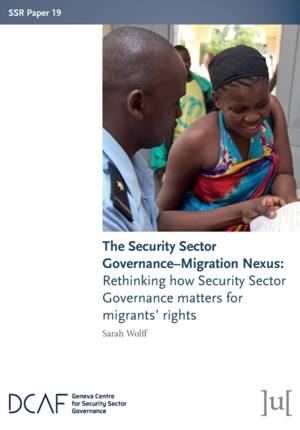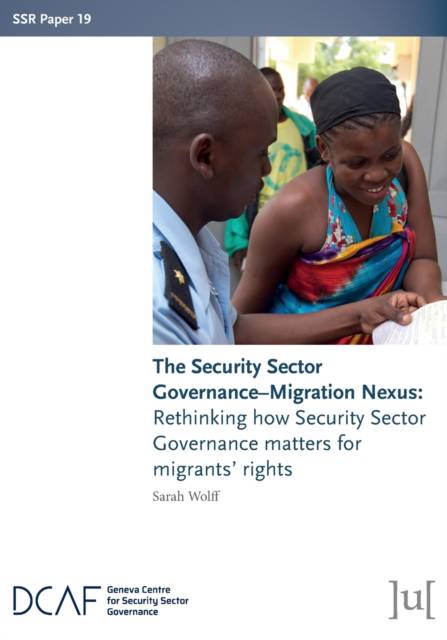
- Retrait gratuit dans votre magasin Club
- 7.000.000 titres dans notre catalogue
- Payer en toute sécurité
- Toujours un magasin près de chez vous
- Retrait gratuit dans votre magasin Club
- 7.000.0000 titres dans notre catalogue
- Payer en toute sécurité
- Toujours un magasin près de chez vous
The Security Sector Governance-Migration Nexus
Rethinking how Security Sector Governance matters for migrants' rights
Sarah WolffDescription
The main argument is that improving migrants' rights and conceptual linkages between SSG/R and migration is best achieved, by decentring our gaze, namely going beyond the 'national' and 'state-centric' view that characterizes traditionally SSG/R and to consider the agency of both migrants and SSR actors. First from a migrants' perspective, it is key for SSR actors to go beyond traditional legal classifications and to consider the diversity of personal situations that involve refugees, stranded migrants and asylum seekers, which might endorse different roles at different times of their journeys and lives. Second, the transnational nature of migration calls for a transnationalization of SSG/R too. For too long the concept has mostly been applied within the national setting of SSR institutions and actors. Migration calls for a clear decentring that involves a transnational dimension and more work among transnational actors and policymakers to facilitate a norm transfer from the domestic to the interstate and international level. As such, the 'transnational' nature of migration and its governance needs to be 'domesticated' within the national context in order to change the mindset of SSG/R actors and institutions.
More importantly, the paper argues that poor SSG/R at home produces refugees and incentivizes migrants to leave their countries after being victims of violence by law enforcement and security services. During migrants' complex and fragmented journeys, good security sector governance is fundamental to address key challenges faced by these vulnerable groups. I also argue that a better understanding of migrants' and refugees' security needs is beneficial and central to the good governance of the security sector.
After reviewing the key terms of migration and its drivers in section 2, section 3 reviews how SSG is part of the implementation of the GCM. SSR actors play a role in shaping migratory routes and refugees' incentives to leave, in explaining migrants' and refugees' resilience, in protecting migrants and refugees, and in providing security. Although it cautions against artificial classifications and the term of 'transit migration', section 4 reviews what the core challenges are in the countries of origin, transit and destination. Section 5 provides a detailed overview of the linkages between migration and each security actor: the military, police forces, intelligence services, border guards, interior ministries, private actors, criminal justice, parliaments, independent oversight bodies and civil society. Section 6 formulates some recommendations.
Spécifications
Parties prenantes
- Auteur(s) :
- Editeur:
Contenu
- Nombre de pages :
- 80
- Langue:
- Anglais
- Collection :
- Tome:
- n° 19
Caractéristiques
- EAN:
- 9781911529927
- Date de parution :
- 13-05-21
- Format:
- Livre broché
- Format numérique:
- Trade paperback (VS)
- Dimensions :
- 178 mm x 254 mm
- Poids :
- 204 g

Les avis
Nous publions uniquement les avis qui respectent les conditions requises. Consultez nos conditions pour les avis.






